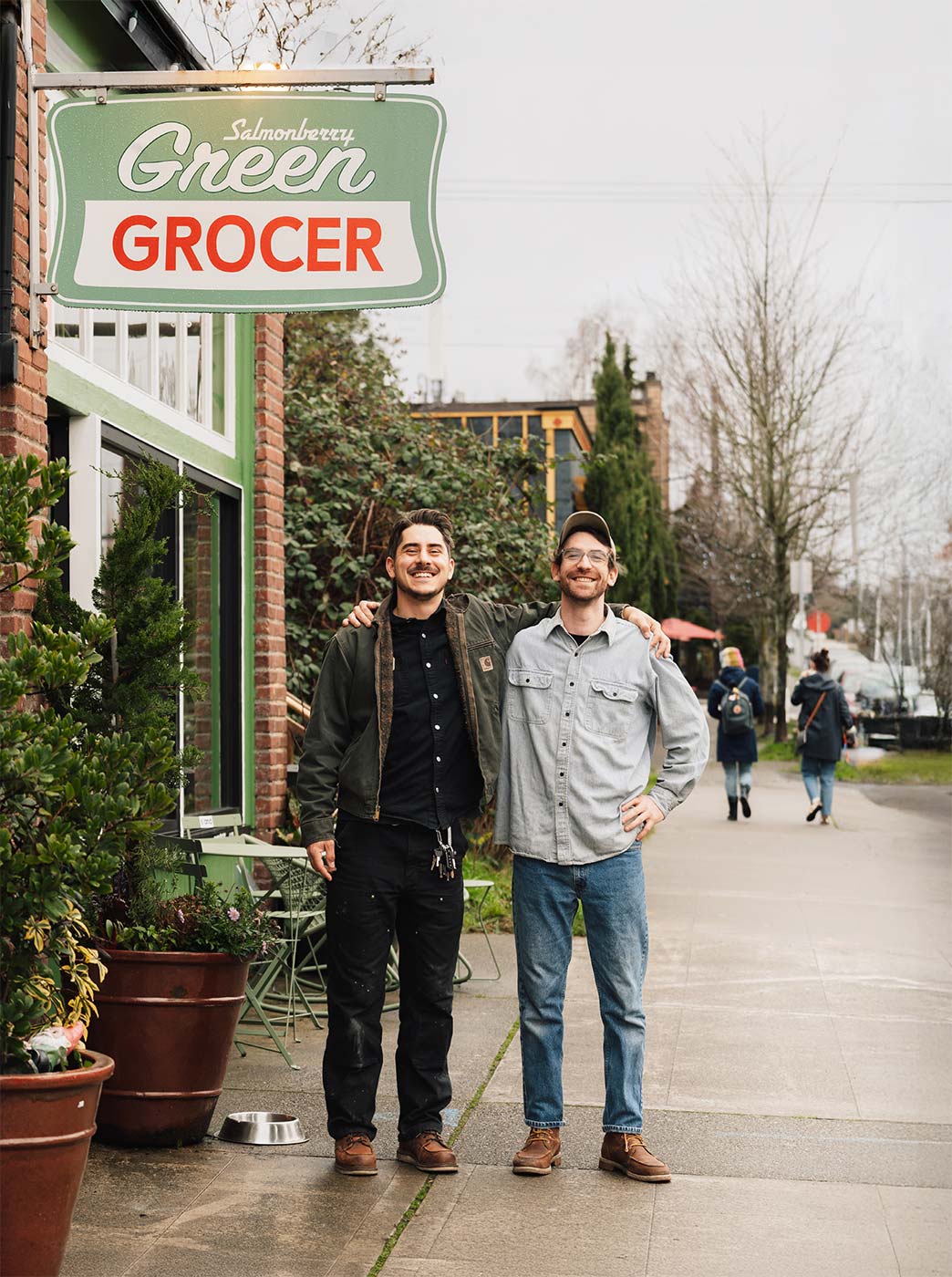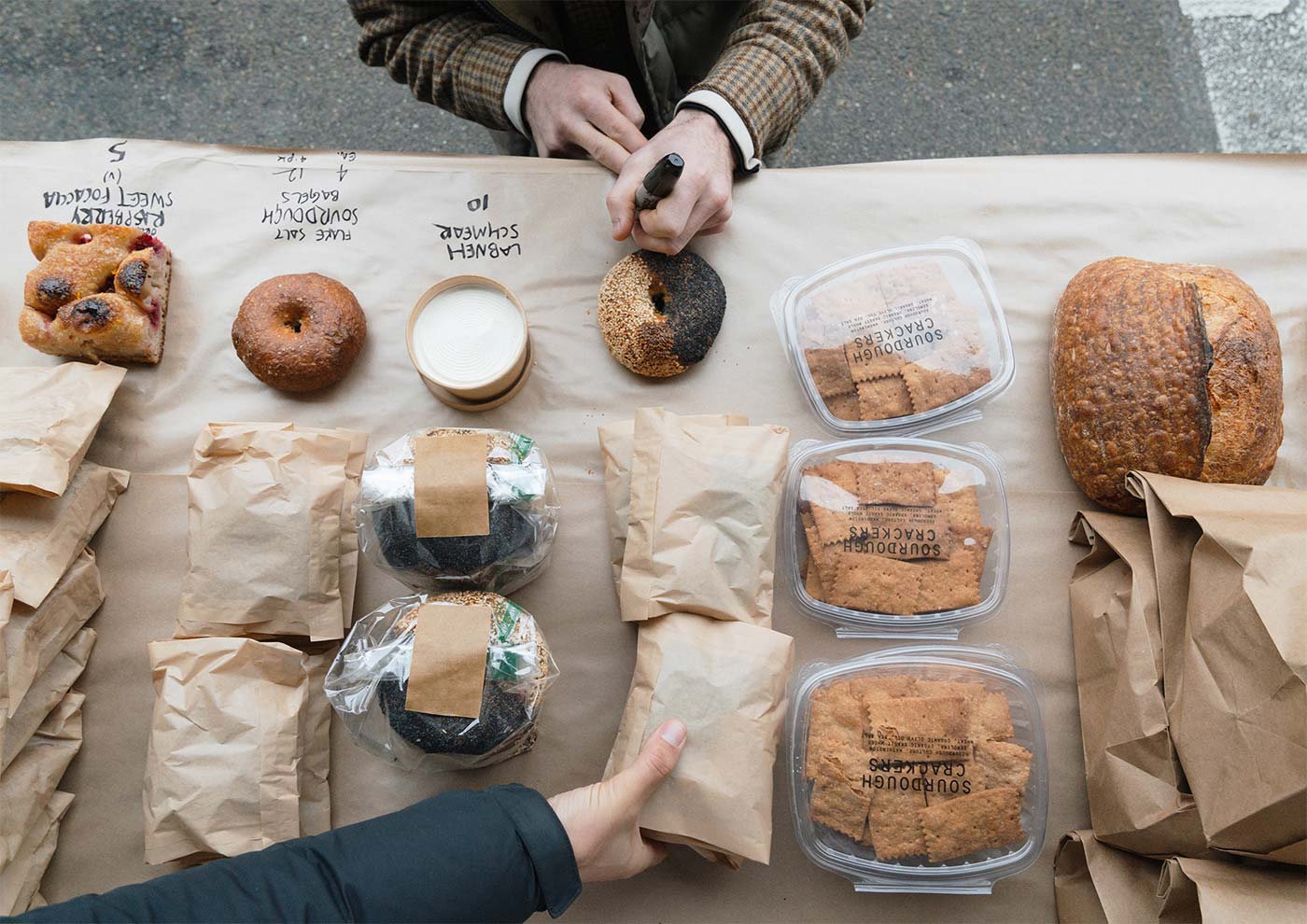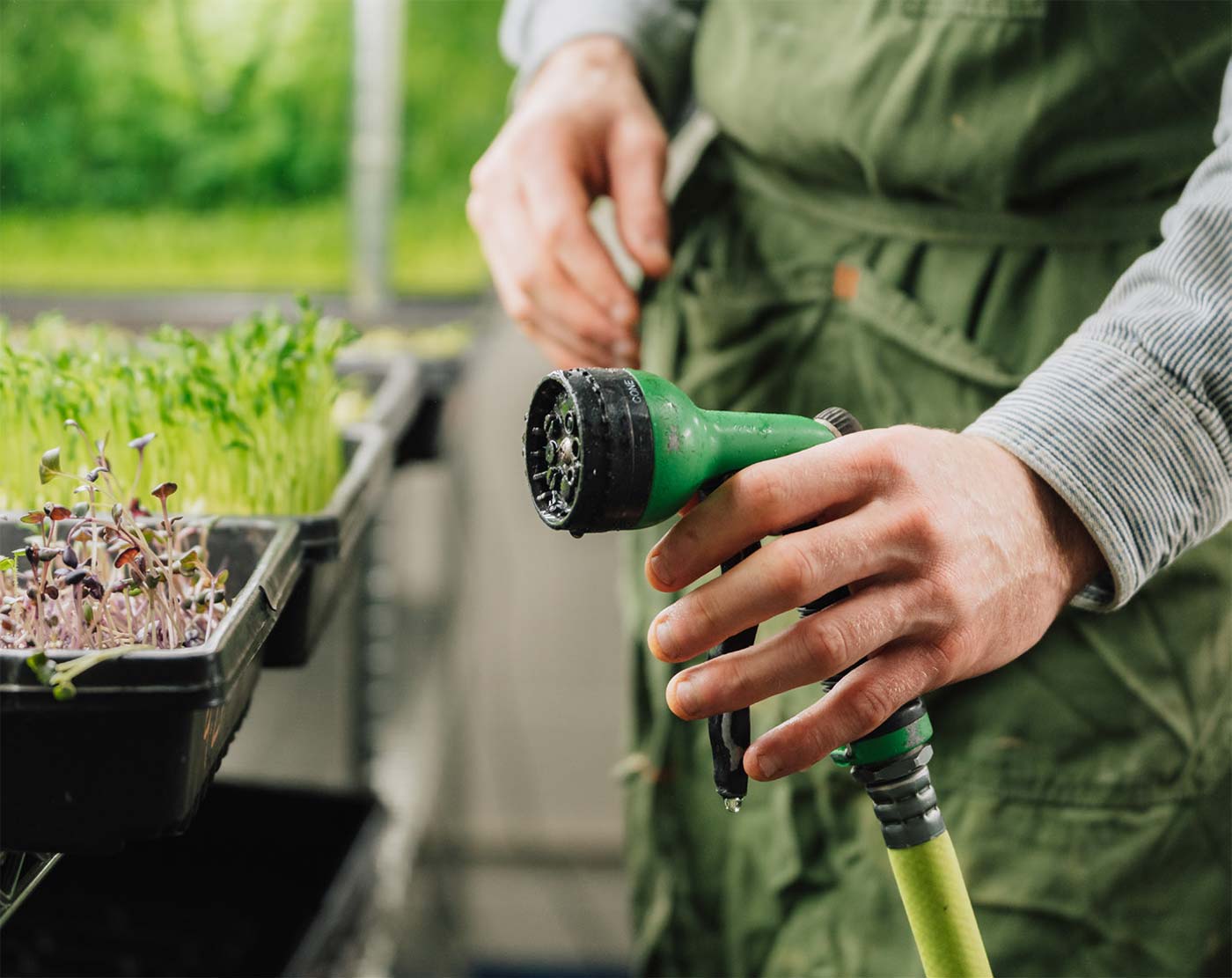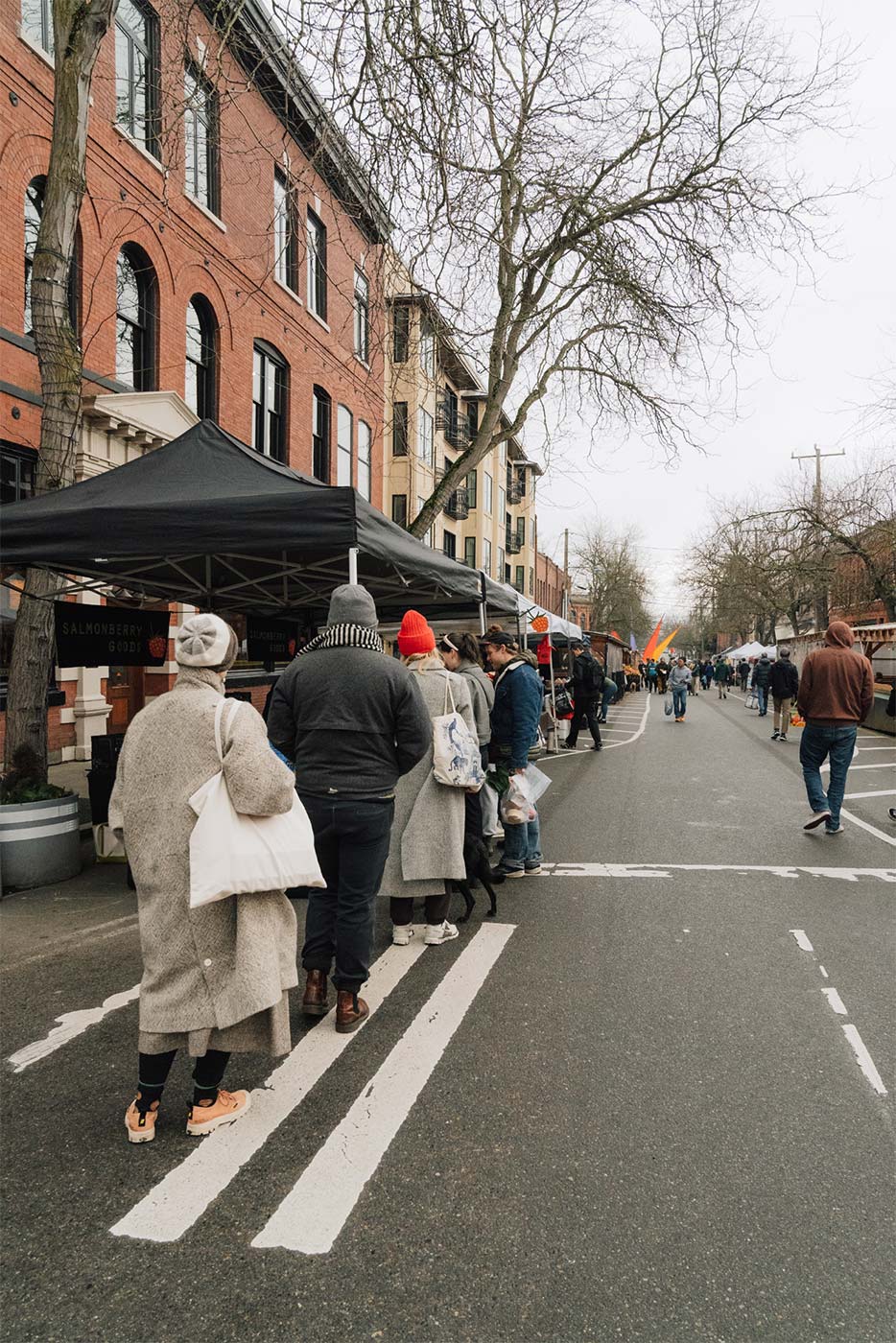
Small farms and seasonality drive success at Salmonberry Green Grocer
IMAGES BY JOSIE HINKE
Longtime Ballard residents may have noticed recent subtle changes to the steadfast Green Market storefront at the top of Sunset Hill. For one, the iconic vintage-style sign above the door now spells out “Salmonberry Green Grocer,” instead of “Sunset Hill Green Market,” but the ethos remains the same. Honoring the legacy of a long-standing community space, while ushering in a new generation of farmers and producers, has guided co-founders David Rothstein and Alex Johnstone since they began planning for a brick and mortar location in early 2024.
Rothstein and Johnstone, the co-owners of Salmonberry Goods and now Salmonberry Green Grocer, have been thinking about the role of community and collaboration in the food system long before the storefront. Their strategies and business models have evolved since they started doing business together in 2015, but they have always been driven by a desire to make supporting small, local farms and businesses an easier choice for customers.
“We want to build the most direct pipeline from the field to someone’s front door,” Rothstein says. Direct access to farmers sets Salmonberry Goods apart from other bakeries, grocery stores and grocery subscriptions. Their website lists the farmers they work with by first name because this is how they know them—personally. This list includes people like John and Roxanne at Spring Rain Farm (Chimacum); Colin and Genine at Kirsop Farm (Tumwater); Melissa and Josh of Newaukum Valley (Rochester) and more.

“Farmers markets have been so woven in the fabric of my life,” Rothstein says. And it’s true. The markets have been part of the Salmonberry story since the beginning.
Before there was Salmonberry Goods, before the weekly Salmonberry Farm Boxes (subscription-based, small farm aggregate grocery boxes) and before the storefront, there was Convoy Coffee—a bike-trailer, pour-over coffee shop that high school friends Rothstein and Johnstone dreamt up on a road trip up from Santa Cruz after graduating college 10 years ago.
Convoy Coffee was the pair’s first foray into small-business ownership. They biked to various farmers markets and sold coffee from local roasters. They traded coffee for produce from the market vendors and built relationships with farmers.
“It was a great food awakening for us,” Johnstone says of their early days. Through conversations with neighboring vendors, Rothstein and Johnstone saw the struggles and triumphs of the farmers, who they began to think of as their community.

As Convoy Coffee expanded and found a home in a brick-and-mortar shop in Pioneer Square, Rothstein and Johnstone wanted their success to be the success of their peers as well.
They looked for pastries to stock at their new coffee shop, wanting to work with businesses that prioritized small, local farms. “We started looking around for bakeries that had amazing sourcing,” Johnstone says. “And we quickly found out it was [few] to none.”
Always eager for a new challenge, Rothstein and Johnstone took on locally sourced, seasonal pastries themselves. They developed products like their popular golden, flaky turnovers, filled with rotating seasonal fruits—lovingly named “Valentines”—roasted potato biscuits, seasonal scones and more.
While in a period of trying to improve their craft, Johnstone and Rothstein also experimented with sourdough made with local grown and milled grains, like those from Cairnspring Mills, which had just launched in Skagit County.
Working with local flour was one of the greatest lessons in baking the self-taught pair could have asked for.
“I think for a lot of bakeries, it’s so much about the processes, like ‘how do you do the same recipe every single time?’ and I felt like working with local grain turned that on its head, where if you tried to apply a rule of ‘every single time’ to sourdough, it will not work. You have to really learn how to taste, smell, touch, hone this really awesome, touching relationship with—ultimately—grain, which changes throughout the year,” Johnstone explains.
“Bread is such a carnal element,” Rothstein says. “People think of flour as this white, bleached stuff that they get in the grocery store with enrichments in it …
“…But it’s oxidizing, and if it’s fresh there’s so many more nutrients available for us, and also the microbes that are living within,” Johnstone says.
“Even living flour appears inert to people,” Rothstein adds.
The trial and error process also led to deeper connections. They built symbiotic relationships with their farmers, vendors and supporters, trading food for feedback. The valued input from friends, neighbors and shoppers alike encouraged Rothstein and Johnstone to get creative with local ingredients.

“We love to say yes to farmers,” Johnstone says of their business philosophy. Some of their most notable products have come from saying yes to farmers. Their eye-catching onion cookie, which marries caramelized onion and snickerdoodle spices, was born from buying end-of-storage onions from a farm they knew from the farmers markets.
It was a similar story with Melissa Henderson and Josh Hyatt of Newaukum Valley Farm, who got much of their business from Seattle restaurants and were hit particularly hard when restaurants closed in 2020. Rothstein and Johnstone wanted to figure out a way to redirect as much of their produce as possible to mitigate the damage to the farm by sourcing as much as they could from them.
Long-lasting, trusting friendships with farmers like these pushed Rothstein and Johnstone to rethink everything they were doing when the pandemic forced them to close Convoy Coffee in 2020. As farmers markets closed too, losing income for their farmer friends like Henderson and Hyatt, Rothstein and Johnstone began brainstorming how they could keep their staff employed, get produce to people and support farmers without the sales channels they had previously relied on.
“Can we somehow facilitate bringing this farm produce to people in Seattle?” Johnstone recalls of their thoughts at the time.
The Salmonberry Farm Box was born less than 48 hours after they closed the coffee shop. “It’s like a CSA [Community Supported Agriculture] built up of many small farms, with the goal of being hyper-usable,” Johnstone says.
Salmonberry still offers choices of boxes containing produce from local farms, plus add-ons from Salmonberry’s bakery. Their “Essentials Box” includes bread, a beverage and a baked good, like their scones or onion cookies, as well as vegetable crops; the “Farm Box” exclusively contains farm products.
What started as a quick fix to get produce to people and payment to farmers during an unprecedented time has evolved into the core of Salmonberry’s business. The pair even began some small-scale farming of their own—a high-density organic microgreens operation that lives inside their Ballard bakery as a means to provide customers with fresh greens even during winter.
The model of combining products from various farms, including their own, means that Salmonberry is able to send fresh produce straight to people’s doors every week of year. This is unmatched access to local farms, built on the relationships that have driven them since the beginning.
“We are sending people exactly what’s coming out of the earth that week from the local farmers around them,” Johnstone says. “It is a subscription because that is the mutual trust that is so important in working with farmers. They’re planting seeds for you before they get the money.”
Collective action has always been at the core of their work, and the Farm Boxes were no different. “It was so community-driven, it was mind-blowing,” Johnstone says. People volunteered their time to pack sourdough, deliver boxes, collect produce and more. “Humans are really adaptable and communities are really powerful.”
This same community support returned to them when the pair announced that they would be acquiring and revitalizing the Sunset Hill Green Market in early 2024.
They had heard rumors that the Green Market was closing in February 2024. They immediately reached out to the landlords, introduced themselves and pitched their idea to preserve the community space under their business.

“We signed the lease by the end of the next month. We put something out like April 1st,” Rothstein laughs. “It was not an April Fools’ joke.”
They spent the next few months collaborating with friends and neighbors to prepare for their soft opening in October 2024. Rothstein and Johnstone say they were blown away by the community interest, with people offering everything from time to financial support to help with the bigger building projects required to get the grocery up and running again.
A retail location hadn’t been a part of their plan, especially after the closure of Convoy Coffee in 2020 and the success of the Farm Boxes, which existed without a brick-and-mortar storefront, but the role that the former Sunset Hill Green Market filled in the neighborhood was aligned with the mission that has driven Salmonberry Goods since inception.
“Operating in the timelessness of a space like this, in the built environment, it serves such a sweet need for, literally, our community,” Rothstein says of the storefront.
The storefront offers a physical representation of the work Salmonberry does, in a way a website or social media account can’t quite capture. “[We wanted] to show the bizarre scope of work that we do, because it’s difficult to articulate. It’s not easy to say ‘small farm aggregate, sourdough baker, microgreen urban farm, kombucha fermentery,’” Rothstein says.
Their work has evolved over the years, but each new project is based on the question “How do we connect people and farmers more?” The Salmonberry storefront is yet another way to support local farmers and bring high-quality produce, locally sourced pastries and freshly baked bread to their community.
People decide to support local agriculture for a variety of reasons—health, ethics, environmentalism, taste. Rothstein and Johnstone welcome them all with open arms. “It’s beautiful to see and be seen by the people who have come to their own conclusion about why [to support small farms],” Rothstein says. “And it’s beautiful that we all come to the same conclusion.”
Salmonberry Goods – Green Grocer
6405 32nd Ave NW
Seattle, WA 98107
salmonberrygoods.com
